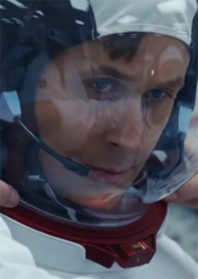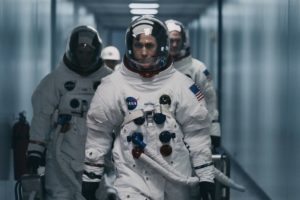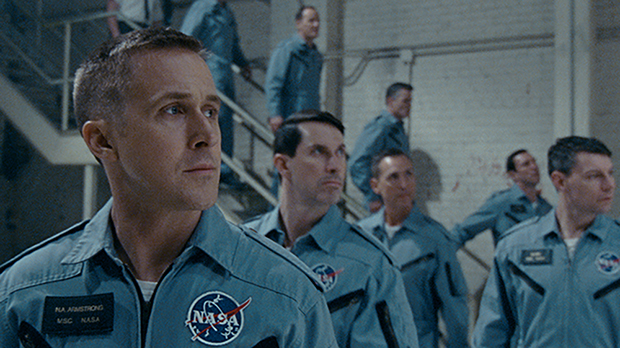
Damien Chazelle’s highly anticipated follow up to 2016’s Oscar-winning La La Land, the film that was also at the center as Oscar’s greatest flub, takes him away from the musically dominated landscape of La La and his previous film Whiplash and launches him into space with First Man. The film is based on Neil Armstrong’s memoir of the same name that was painstakingly put together by James R. Hansen, who also serves as a producer on the film, and was adapted for the screen by Josh Singer who carved out his name adapting other true stories with The Post, Spotlight and The Fifth Estate.
Starting in 1961 with Neil Armstrong (Ryan Gosling) running atmospheric tests in jet planes for NASA in the desert, First Man goes through the tragic death of Armstrong’s infant daughter Karen which threatens to eat Neil up from inside but also serves as a driving force to focus him only on his work. Armstrong’s wife Janet (Claire Foy) is left to keep the house afloat as Neil’s focus becomes solely that of getting into space. Surrounded by NASA brightest minds, Neil eventually ends up on the Gemini project- the precursor to Apollo, as the team fights to beat the Russians in the great race to the sky.
A lot of the time it’s the big showy roles that garner the most attention come awards season. The big range of emotions, the ‘clip worthy’ scenes of raw emotion all tends to dominate the nominee lists. But more should be focused on the internal and controlled, yet conflicted, performances the like what Gosling delivers here. It’s a fantastic turn that deserves all the praise it gets. Foy provides an adept sparing partner on screen for Gosling, portraying Janet as a whip-smart and confident woman that challenges Neil to remain invested at home every step of the way. Chazelle smartly fills the NASA landscape with accomplished and recognizable faces with Jason Clarke, Kyle Chandler, Pablo Schreiber, Ciaran Hinds, Corey Stoll and Shea Whigham all playing famous faces from the NASA program during that time, names that should stick out to fans of previous films based on the period like Apollo 13 and The Right Stuff. Even characters that barely utter a word on screen but are important figures from the Apollo missions are given recognizable faces like Ethan Embry and Lukas Haas, proving that Chazelle does have a reverence for all the men involved in this mission.
Speaking further to Chazelle’s reverence for the space program, First Man uses old lenses and a partially frenetic camera style to attempt to recreate the feeling of the old NASA mission movies with great effect here. With grain and age appearing in many shots as a supporting character bringing in audiences to the story, which helps add to the belief in the film despite Gosling and Foy being way too familiar faces to simply disappear into their characters, Chazelle’s choice of the look of the film helps sell the performances even more. Chazelle shot all the lunar sequences for the film in natural IMAX with IMAX film to help drive home the grand scale that arriving on the moon should have and it’s far more than just a gimmick. The IMAX shot sequences are the only parts of the film in crystal clear focus and seeing it on an IMAX screen just drives home the vastness of the accomplishment. In fact, Chazelle proves to have an adept hand behind the camera for the entire film here, the biggest in scope and budget of his career, and will likely be all over nominee lists come award season again this year, deservedly so.
First Man may tell a story that has been explored before with the Gemini and Apollo missions and America’s great race against the Russians for space domination, but it does more here in telling us about the man who took that first step for an entire nation. Armstrong remained a guarded and reserved man for his entire life, unlike the more enigmatic Buzz Aldrin that became more of a media darling, opting to shy away from the spotlight that enveloped him upon his return from the moon. First Man gives us a better look at a private man and told through great writing, direction, and acting, audiences can walk away feeling they may have finally gotten a true glimpse of who Neil Armstrong really was.
- Release Date: 10/12/2018


